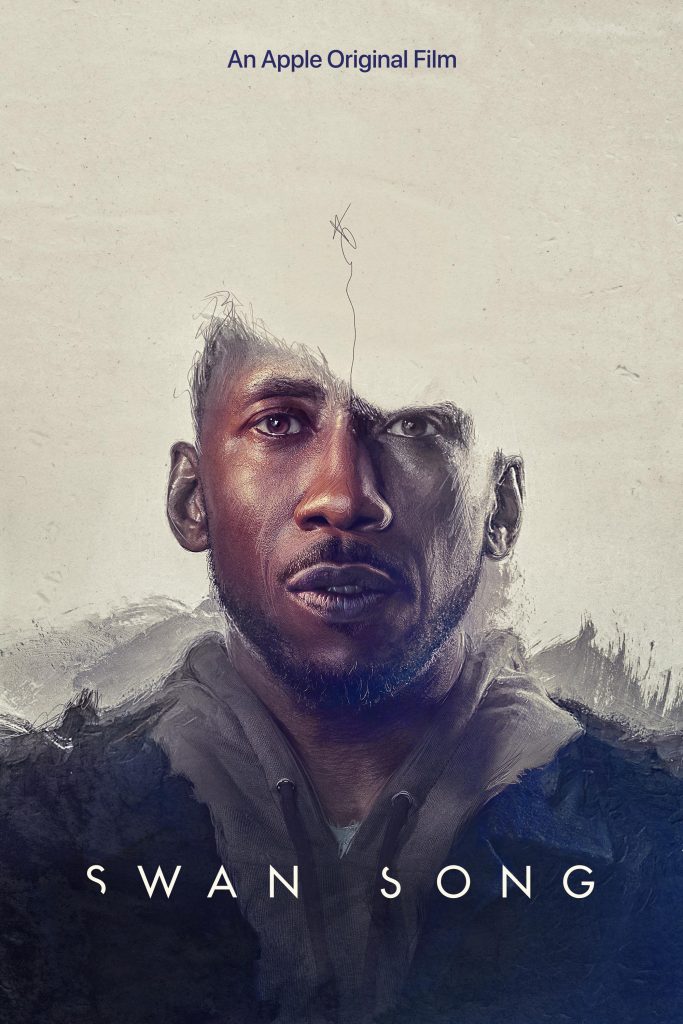Let’s talk about Mahershala Ali.
He is one of the best actors working in Hollywood, injecting a piercing soulfulness and dignity into his roles, no matter where they land in the character binaries of hero and villain, protagonist and antagonist. He makes indelible impressions in all his projects, capturing our attention when it’s supposed to be elsewhere. Ali has won two Best Supporting Actor Oscars in three years, for Moonlight and Green Book, a rare feat that confirms that the industry knows the talent they have in front of them.
And yet, Swan Song is his first major leading role, nearly four years after his last Oscar.
Hollywood’s lack of imagination about using such a magnetic performer is all the more stunning—and indefensible—once the film begins. Ali plays Cameron, a creative designer living in a tech-enhanced near-future with his wife Poppy (Naomie Harris) and their young son. He’s carrying a secret from them: he’s dying from an unnamed terminal illness. Faced with devastating his family, especially Poppy, who’s two months pregnant with their second child and recovering from mental health issues, Cameron explores replacing himself with a clone without them knowing.
Swan Song is nowhere near the first film to discuss cloning, but writer-director Benjamin Cleary’s approach to the subject feels unique and poses interesting, challenging questions about technology and ethics, individuality, and consent. Cameron is cloning himself to spare his family pain from his deteriorating condition and eventual death, but what is he taking from them by making this life-altering decision without their input? Cameron’s clone Jack may be a carbon-copy down to the molecule, but isn’t he still ultimately a different person, and isn’t Cameron forcing this other person into their lives—into Poppy’s bed—without their consent an egregious breach of trust? Ali conveys minute subtle differences in Cameron and Jack’s physicality, demeanor, and how they process information that compellingly undercuts the argument that there is no meaningful distinction between them.

The film’s concept and Ali’s performance seem ready to push that conversation forward, but Swan Song mainly spins its wheels. It spends a lot of time navel-gazing through Cameron’s past, ostensibly to load his memories onto Jack but also to assess the emotional toll this endeavor takes on him. Cameron’s sacrifice is palpable and strongly resonates, especially when the camera peers into his eyes (which is understandable given how much Ali can say through them). However, that intense emotional focus leaves for a film that, even with quick bursts of suspense and fun, can feel overwhelmingly somber with a lack of dramatic movement. There are moments when the film approaches full engagement with its premise, but it always pulls itself back from the brink. Were it not for Cleary’s captivating blend of contemporary life with advanced technology and the performances, Swan Song could’ve devolved into a high-minded Nicholas Sparks outing.
Swan Song’s contemplative approach indeed would’ve fallen apart without Mahershala Ali’s stunning lead performance. In many ways, the characters of Cameron and his clone Jack are tailor-made for him and play to his strengths, particularly his ability to convey thoughtfulness and sensitivity. However, nothing about Ali’s performance suggests he’s coasting or resting on what works for him. Even at the film’s most meditative, Ali emanates an aura on-screen that draws you into his characters and makes you care acutely. He thoroughly plugs into Cameron and Jack as individuals and how their shared extraordinary circumstance can fray their sense of selves. Even when the script doesn’t meet him, he projects an inner life and adds deeper significance to the sentimentalism that keeps the film from slipping into saccharine territory.

It also helps that he has excellent chemistry with the whole cast, including himself. Naomie Harris, who is even more underutilized than Ali in Hollywood, is excellent as Poppy, playing the unsuspecting wife with humor, allure, and a touch of sadness. Her performance makes the film’s disinterest in pushing into more compelling issues around ethics and consent all the more disappointing, considering how deeply she could sink her teeth into that material. Glenn Close, playing Cameron’s doctor, and Awkwafina, playing another cloned patient, don’t have much to their roles but add layers of practiced indifference and pain-laced humor to the story that, once again, the film does little with.
It feels crazy to say this, especially given where we are as a society, but Swan Song is almost too nice. The film’s earnest tackling of a heady scientific subject, grounding it in emotional stakes, is easy to appreciate. Still, it’s hard to ignore the missed opportunities to dig even deeper to offer a perspective on any of the questions that the film is hesitant to discuss. Even one or two steps towards a conversation about whether science can create or duplicate a soul would push Swan Song into the welcome company of The Matrix or Black Mirror. Instead, the film has to settle for being a handsomely shot vehicle for Mahershala Ali to demonstrate his limitless potential as a leading actor. It’s a fruitful endeavor, for sure, but I can’t help feeling like Ali deserves so much more than that.
Swan Song is currently available to stream on Apple TV+.
Also published on When Things Go Pop.

Before we let you go, we have officially launched our merch store! Check out all of our amazing apparel when you click here and type in GVN15 at checkout for a 15% discount!
Make sure to check out our podcasts each week including Geek Vibes Live, Top 10 with Tia, Wrestling Geeks Alliance and more! For major deals and money off on Amazon, make sure to use our affiliate link!
A late-stage millennial lover of most things related to pop culture. Becomes irrationally irritated by Oscar predictions that don’t come true.







